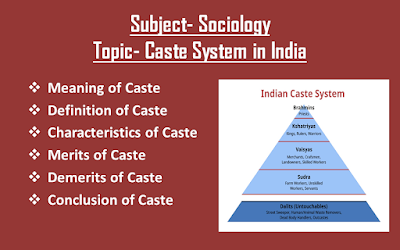Out Group- Meaning, Definition, Characteristics and Importance
# Out-Groups
A group to which we do not belong is called an out-group.
There is a sense of ‘they feeling’ in relation to an out-group.
An out-group is a social group to which an individual does not belong or identify with. It is a group that is perceived as different, distant, or separate from one's own in-group (the group to which one belongs). Out-groups can be formal or informal, and can range in size from small to large.
For example, a different ethnicity, race, or religion, a rival sports team or political party, a different socioeconomic class or education level, a different age group or generation and a different cultural or linguistic background are all instances of out-group.
# Definition of Out Groups
1. According to William Graham Sumner:- "A group of people who are viewed as different, distant, and often as a threat to the in-group's interests and values."
2. According to Charles Horton Cooley:- "A group to which one does not belong, and with which one does not identify oneself."
3. According to Muzafer Sherif:- "A group to which an individual does not belong, and towards which he feels a sense of competition, distrust, or hostility."
4. According to George Herbert Mead:- "A group that is not part of one's own social group, and with which one does not share a common social identity."
5. According to Robert Merton:- "A group that is defined as different, inferior, or deviant by one's own in-group."
# Characteristics of Out Groups
1. Perceived difference:- The out-group is perceived as different from one's own in-group.
2. Lack of identity:- Individuals do not identify with the out-group.
3. Distance:- The out-group is seen as distant or separate from one's own in-group.
4. Exclusion:- The out-group is excluded from the benefits, resources, or privileges of the in-group.
5. Competition:- The out-group may be seen as competing with the in-group for resources, status, or power.
6. Negative attitudes:- In-group members may hold negative attitudes, stereotypes, or prejudices towards the out-group.
7. Lack of trust:- In-group members may distrust or be suspicious of the out-group.
8. Different values or beliefs:- The out-group may hold different values, beliefs, or norms than the in-group.
9. Power dynamics:- The out-group may have less power, status, or influence than the in-group.
10. Conflict:- The in-group and out-group may have a history of conflict or tension.
# Importance of Out Groups
1. Out-groups provide a contrast to in-groups, clarifying individual identity and belonging.
2. Out-groups serve as a source of new ideas, perspectives, and innovations.
3. Out-groups offer opportunities for social comparison, self-evaluation, and growth.
4. Out-groups facilitate intergroup communication, cooperation, and conflict resolution.
5. Out-groups provide a platform for social mobility, change, and progress.
6. Out-groups challenge in-group norms, promoting critical thinking and creativity.
7. Out-groups foster empathy, understanding, and tolerance through exposure and interaction.
8. Out-groups support personal autonomy, independence, and self-expression.
9. Out-groups enable individuals to explore multiple identities, roles, and affiliations.
10. Out-groups stimulate competition, driving innovation, improvement, and excellence.
Watch video on YouTube





